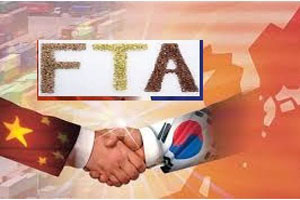
Beijing-Seoul FTA to have 30pc impact on Taiwanese textile exports
YarnsandFibers News Bureau 2014-11-26 18:30:00 – TaipeiChina and South Korea announced earlier this month that they have concluded talks on the FTA, which is expected to go into effect in mid-2015. The announcement has stirred up concern among Taiwanese exporters over South Korea's rising competitive edge against Taiwan in the huge China market.
A free trade agreement (FTA) between China and South Korea could grant tariff free status to 85 percent of the textile items exported to the China market by South Korea in the future, this could cost Taiwan loss of more than NT$10 billion (US$324 million) in textile exports per year, according to the Taiwan Textile Federation (TTF).
The NT$10 billion loss is a conservative estimate based on the assumption that 30 percent of Taiwanese textile exports will be replaced by South Korean counterparts on the back of their tariff-free status under the Beijing-Seoul FTA. If the impact goes deeper, the loss will no doubt be even larger.
The Trade group said that exporters from South Korea are very likely to take a bigger share of the Chinese market at a time when Chinese buyers are preparing to shift their orders from Taiwan to South Korea in order to get cheaper textiles.
As per TTF, fabrics, yarn and fibers are among the major textile products Taiwan sells to China, while fibers, garments and accessories are among the major items South Korea exports there.
TTF is of the view that Taiwan need to speed up the pace of signing a trade-in-goods agreement with China In a bid to stem the adverse impact of the Beijing-Seoul FTA . As of now, nine rounds of negotiations on the trade-in-goods pact have been held between Taiwan and China which is a follow-up deal to the landmark Economic Cooperation Framework Agreement (ECFA) signed by Taipei and Beijing in 2010.
According to a recent government assessment, Taiwanese industries, including textile, petrochemicals, flat panels, machine tools and steel will be affected by the China-South Korea FTA. As these industries serve as the major driver to Taiwan's export growth, the FTA could knock down Taiwan's exports by 1.35 percent, or US$3.75 billion.
Market Intelligence
Ask for free sample Report

experience
Customer Base
dedicated team
Countries Served Worldwide









